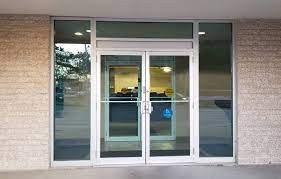When it comes to commercial buildings, the doors are one of the most important elements to consider. Not only do they need to be functional and durable, but they also need to complement the overall aesthetics of the building. However, with so many options available in the market, it can be overwhelming to choose the right doors. In this guide, we’ll provide you with all the information you need to make an informed purchase decision when it comes to commercial doors.
Door Material – The first thing to consider when choosing commercial doors is the material. The most common materials used for commercial doors are steel, aluminum, wood, and glass. Steel doors offer durability and security and are ideal for high-traffic areas. Aluminum is lightweight and corrosion-resistant, making it perfect for outdoor spaces. Wooden doors add warmth and elegance but require regular maintenance. Glass doors offer natural light and transparency, but they’re not very secure.
Door Style – Once you’ve chosen the material, the next thing to consider is the style of the door. The most common styles for commercial doors are swing doors, sliding doors, and revolving doors. Swing doors are the most traditional and common type and open and close on a hinge. Sliding doors slide sideways to open and close, making them ideal for spaces with limited floor space. Revolving doors offer a grand entrance and also help conserve energy by reducing air exchange.
Door Hardware – The hardware on your commercial door is just as important as the door itself. The most common hardware components are locks, handles, hinges, and closers. Locks are essential for security, and you can choose from various locking mechanisms such as deadbolts and latch bolts. Hinges attach the door to the frame and support the weight of the door. Handles make it easy to open and close the door. Closers ensure that the door closes softly and prevent it from slamming shut, which can cause damage.
Door Maintenance – Commercial doors are subject to constant wear and tear, so it’s essential to choose doors that are easy to maintain. Steel and aluminum doors require minimal maintenance and can be cleaned with soap and water. Wood doors require regular staining or painting to prevent rotting and warping. Glass doors require regular cleaning to prevent smudging and streaking.
Door Installation – Finally, the installation process is critical when it comes to commercial doors. Ensure that you work with a reputable contractor who can install the door correctly and efficiently. The installer should also have experience working with commercial doors, especially since commercial doors are much larger than residential doors.
Conclusion:
Choosing the right commercial doors for your building is critical for both functionality and aesthetics. By considering the material, style, hardware, maintenance, and installation, you can ensure that your commercial doors meet all of your needs. Keep in mind that commercial doors can be a significant investment, so it’s essential to choose high-quality doors that will last a long time. If you’re unsure what type of door is right for your building, consult with a professional who can guide you through the process.






